The past year has been challenging for everyone – healthcare workers, teachers, suppliers, and everyday people. The team here at Masten has not only navigated the pandemic like all of you, we’ve also been getting ready to land on the Moon’s south pole. We’ve been adapting the mission plan to account for COVID-19 supply chain delays and manage conditions as they evolve, but the overall impact on our timeline reached a point where we need to shift to the next window to go (as you know, there’s a limited accessibility window to the south pole due to the orbit of the Moon).
In true Masten fashion, we value the no BS approach, so we want you to hear it from us first. Check out the full announcement below for more details.
– Sean Mahoney, Masten CEO
– – –
Mojave, California, June 23, 2021 – Masten Space Systems is proud to be one of NASA’s providers for lunar delivery services to the Moon as part of the agency’s Commercial Lunar Payload Services (CLPS) initiative. Masten Mission 1 includes delivery of science and technology instruments near the Haworth Crater at the lunar south pole, a site expected to offer insight into the presence of important volatiles on the Moon. In addition to commercial payloads, Masten’s XL-1 lunar lander will deliver and operate eight NASA-sponsored payloads to assess the composition of the lunar surface, evaluate radiation, and detect volatiles, such as water, methane, and carbon dioxide, under the agency’s Artemis program.
Given the importance of this mission to scientific research and future human exploration, Masten is taking all necessary steps to ensure its success. Accordingly, due to the cumulative effects of the COVID-19 pandemic and industry-wide supply chain delays, Masten has adjusted the mission schedule from December 2022 to November 2023. This adjustment is the result of careful consideration of mission objectives, conditions on the lunar surface, and supplier timelines.
“We’ve all been impacted by the pandemic in some way, and the aerospace industry is no exception,” said David Masten, CTO and founder of Masten. “However, we’ve consulted with NASA, our launch provider, and payload partners, and we have full confidence in the new mission schedule. Our team continues to make progress on XL-1 development and achieve important milestones that will help ensure a safe, precise landing near the resource-rich Haworth Crater.”
In addition to accounting for COVID-related delays, the schedule adjustment to 2023 will enable reduced shadowing from nearby terrain, which allows for more power generation and more time for science and exploration. XL-1 relies on solar power to operate its instruments, so maximizing exposure to the sun is vital to mission success.
“Masten Mission 1 will be the first of many Masten missions to the lunar surface and beyond,” said Sean Mahoney, Masten CEO. “With capacity for additional payloads, we welcome more partners to join us on this mission and future missions to come. We look forward to building a vibrant lunar economy by enabling regular, ongoing access and utilization of the Moon.”
About Masten Space Systems
Masten Space Systems is enabling sustainable access and utilization of the Moon, Mars, and beyond. Founded in 2004, Masten has been building and flying reusable rockets for nearly two decades with the most successful rocket-powered landings in the industry. The company is now applying its terrestrial rocket experience to lunar missions that will accelerate space ecosystems and enable new commercial applications. Masten’s end-to-end mission solutions include everything from tech development and testing to off-Earth delivery and operations. Based in Mojave, California, Masten aims to unlock the value in space to benefit humans on Earth, starting with Masten Mission 1 to the lunar south pole.
Masten Press Contact
Risa Schnautz
Director of Marketing & Communications
media@masten.aero


